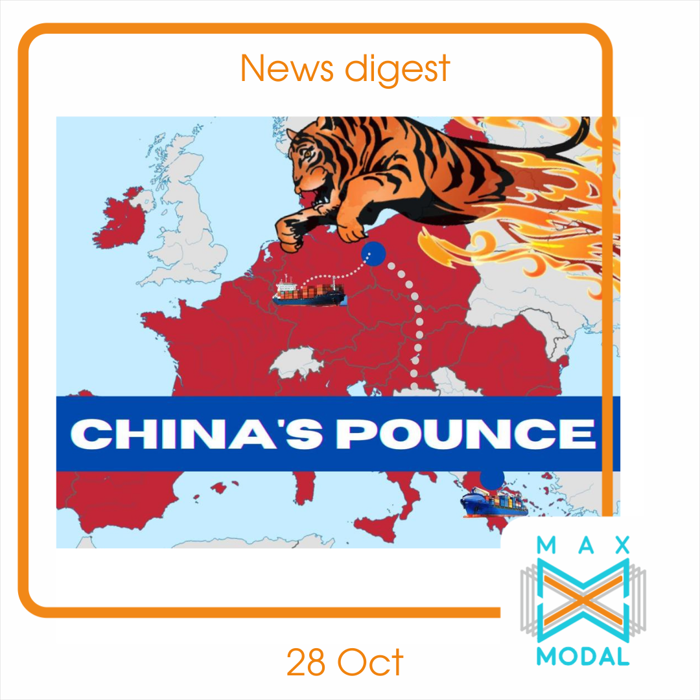News digest. 28 Oct
Another link between the EU and China has been strengthened. The Port of Hamburg and the Piraeus Port in Greece have topped the list of the recent Chinese partners.
Lately, China has been confidently expanding in the European direction and now we can see the results – the first container block train has arrived at the Port of Hamburg from Shanghai commemorating the beginning of the significant partnership that goes far beyond collaboration in the transportation sector into education, culture, and science. In addition, the country has marked its milestone in cooperation with Greece thanks to COSCO Shipping that has increased its stake by 16% for the Piraeus Port Authority. The focus on the marine industry is justified by the government’s concern that the railways might not be able to handle sky-high rates. There are now talks that this year will probably be the last year for the Chinese government to subsidize the train services on New Silk Road, but the decision will introduce more opportunities for the launch of the new reefer container and re-shape of goods structure. However, it will also provoke the imbalance of eastbound and westbound traffic, which has already taken place. China Railways has released an official mandate to stop the loading of outgoing trains via the border with Kazakhstan due to the big backlog. Numerous trains are waiting to cross it, and there are no alternatives so far.
France, on the other hand, is pushing towards rail development by drawing the national plan in order to reverse rail’s lost market share during the coming years. The most attention will be focused on three market segments: single-wagon transport, combined transport, and intermodal transport that align with the general European agenda. The coming partnership with Belgium may come in handy. The port of Zeebrugge is planning to expand its inland connections by launching a new direct rail freight connection to Marseille. Strengthening the ports positions by enhancing railway connection is a great move especially when the ports all over the world have been significantly weakened. The latest victim of congestion is the Port of Seattle. The 2M carriers, Maersk and MSC, with VSA partner Zim, will drop it from the schedule for the time being. Meanwhile, container volumes keep rising with China reporting a 10% increase in throughput.The largest increase comes from Beibu Gulf Port with a year-on-year increase of 19.1%, processing 4.19 million TEU. As containers pile up, some companies come up with creative ideas on how to get their materials and goods delivered. One of them is UCC, a Qatari construction company, that has opted to use bulk carriers from China to complete an express mega construction project. The move is another example of the trend of repurposing and strengthening bulk carriers to carry containers that started earlier this year. Among other strategies that companies are trying to use are the attempt to diversify sourcing and add capacity. Retail, construction business and now, pharma have become the victims of supply chain disruptions. The latter claims that the global semiconductor chip shortage is causing delays, order cancellations and other supply shortages for medical device companies.
Can the freeports take the fire on themselves? The areas where tariffs on imports are either substantially cut or waved in a bid to stimulate economic growth can significantly improve efficiency. Thames Freeport will open for business in November and will connect all freeport sites to the consumer markets of London and the South East, creating the infrastructure for an innovative and green trading corridor.
The recent fire on the Zim Kingston has sparked many concerns regarding the possible environmental damage, however, it has been confirmed that the smoke is dispersing. The fire onboard is now said to be limited to a number of hotspots. Additional losses have been taken place – although initial reports indicated that boxship lost 40 containers overboard during the storm, that number has been revised upward to more than 100 boxes. As for the green agenda, it seems like the use of drones could offer an unprecedented opportunity for the logistics industry to cut CO2 emissions for local delivery by half. The problem comes with regulations allowing UAVs to fly beyond visual line of sight and integrate with other air traffic, as well as the need for well-structured regulation that defines the roles and responsibilities of all stakeholders that utilize airspace.
Regulations are often a stumbling stone in the way of development. For instance, Northern Ireland is still under the jurisdiction of certain EU rules, and checks remain in place for goods entering from Great Britain. The issue is taking a lot of time to resolve in the post-Brexit framework. The future of the protocol guiding the UK-EU trading relationship is now under everyone’s gaze.
As stakes rise higher and competition increases, Maersk was reported to cut off some forwarders, focusing on bigger clients to achieve more profit. However, the company has rejected the accusations by diplomatically stating that its rejections to some customers are based on the strategy to enhance the unpredictable reliability of the market. Meanwhile, there are rumors that Maersk is going to acquire Hamburg-based SME freight forwarder, Senator International.

